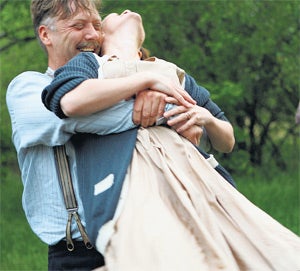Everlasting Moments (15)

Your support helps us to tell the story
From reproductive rights to climate change to Big Tech, The Independent is on the ground when the story is developing. Whether it's investigating the financials of Elon Musk's pro-Trump PAC or producing our latest documentary, 'The A Word', which shines a light on the American women fighting for reproductive rights, we know how important it is to parse out the facts from the messaging.
At such a critical moment in US history, we need reporters on the ground. Your donation allows us to keep sending journalists to speak to both sides of the story.
The Independent is trusted by Americans across the entire political spectrum. And unlike many other quality news outlets, we choose not to lock Americans out of our reporting and analysis with paywalls. We believe quality journalism should be available to everyone, paid for by those who can afford it.
Your support makes all the difference.Its chocolate-boxy title belies the spirit of melancholy, even of desperation, that underscores Everlasting Moments.
The venerable Swedish filmmaker Jan Troell, in his 78th year, reaches back to the early years of the 20th century in recounting the story of the Larsson family, specifically of a capable and long-suffering woman who not only raises seven children but has to cope with the philandering of a drunken, violent husband. It is based on a true story told in her dotage to Troell's wife Agneta by Maja, the woman's eldest daughter.
Opening in the Swedish town of Malmo in 1907, it relates how a young working-class mother, Maria (Maria Heiskanen), wins a camera in a lottery and, instead of selling it, is taught how to use it by a professional photographer, Pedersen (Jesper Christensen).
The film is conventional at heart, yet it's beautifully photographed, in a kind of creamy sepia, and has a painterly sense of interiors and landscape: imagine a scenic collaboration between Renoir and Hammershoi. It's also very finely acted by Maria Heiskanen, who makes of her thwarted heroine something quite moving, especially in the unspoken (and requited) love she conceives for Christensen's gentle photographer. The choice between self-sacrifice and self-realisation is held in painful equilibrium. What Troell also manages in a quiet, unobtrusive way is a story of nationhood, first in Sweden's labour relations (a dockers' strike brings in English blacklegs) and then in its involvement in the Great War. At times it feels like something that has been cut back – the ever-expanding brood of children, for instance, is not well individualised – and it's a mark of Troell's mastery that we could happily have borne another half-hour of his mesmerising yarn.
Join our commenting forum
Join thought-provoking conversations, follow other Independent readers and see their replies
Comments